-
News & Events

In this episode, Gloryren has invited Prof. Hatz for our interview. He holds the Chairs of the Department of Thoracic Surgery at University Hospital of Ludwig Maximilian University (LMU) of Munich and at Asklepios Lung Center Munich-Gauting, he is also a fellow of the American College of Surgeons. Today he would talk about his successful experience of managing two internationally renowned thoracic surgery centers and how the Department of Thoracic Surgery at LMU grew up as one of the largest lung transplant centers worldwide.
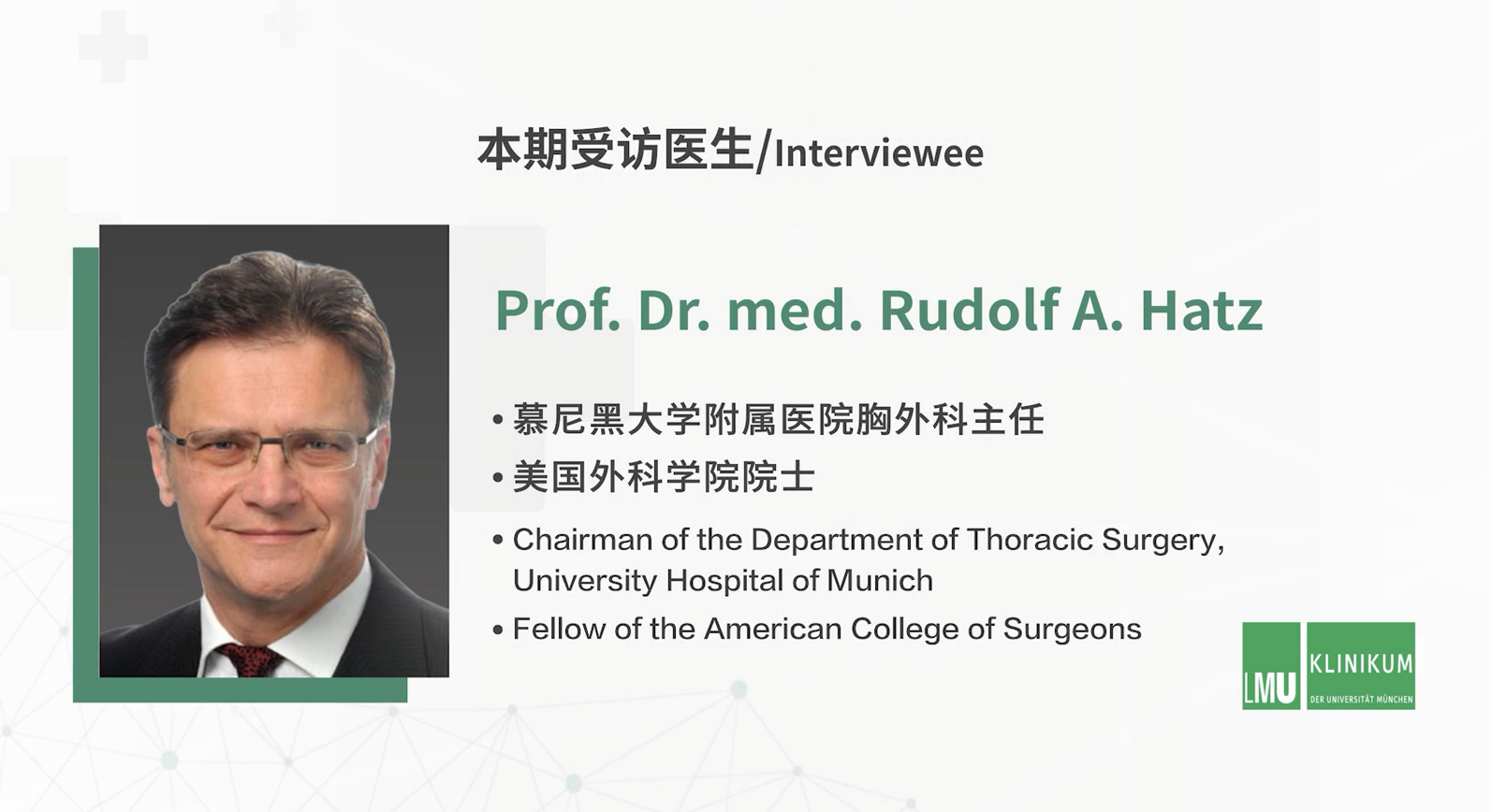
Question1: When did you decide to pursue a career in medicine and why, in particular, did you decide to specialize in thoracic surgery? How did your early youth experience shape your success?
My decision to pursue a career in medicine was substantially influenced by my parents who were both hard-working general practitioners. I was born in Chicago USA. My parents had an office in an old neighborhood with many former immigrants from Germany and Polen. Next to their normal office hours, they worked as senior consultants in one of the large Chicago city hospitals taking care of their patients in the hospital. They assisted in smaller operations and also took care of their pregnant female patients during maternity and during delivery of their children in the hospitals. As a child I often accompanied them to their office and to the hospital, waiting long hours in admissions until they finished their rounds. In those days it was hard work with long office hours and many emergency visits to their patients during the night.
I was ten when I decided to become a medical doctor. At the same age, I also wished to become a surgeon. I made this decision after I read a remarkable book on the history of famous surgeons. The book was called: „Im Weltreich der Chirurgen“ (Translated „In The Surgeons’ world“) I read it in the German language although I was raised in the American schools speaking, reading, and writing the English language. This was possible since I visited a German boarding school in Bavaria Germany starting at the age of ten many thousands miles away from home. I was fascinated by this book. I still have it in my library.
I returned to Chicago when I was thirteen and went to high school and returned to Germany when I was sixteen. I finished school (in Germany it is called Gymnasium = college) three years later. All these years in my youth going back and forth between the two countries had an important impact on my further future success in my profession. I learned discipline, hard work, open-mindedness, diligence, patience, creativity, and modesty.
Question2: Who have been your greatest influences? Based on your experience, how important is it for a surgeon or medical doctor to have their fellowship at different hospitals or in different countries?
Due to my college performance, I received the Bavarian scholarship (= Hundshammer Stipendium für Hochbegabte) for gifted students during Medical School at the Ludwig Maximilian University of Munich. After my first two years in Medical School, I started working on experiments for my doctoral thesis in medicine (Dr. med.) I did electrophysiologic studies looking at the development of acute myocardial infarction during the early postoperative phase after myocardial revascularization by coronary artery bypass grafting in the heart. I met many well-known heart surgeons in Munich including Prof. Kreuzer and Prof. Reichart who became internationally renowned heart surgeons. Later, he became the successor of Prof. Christian Bernard at the Crote Sur Hospital in South Africa. Christian Bernard performed the first heart transplant on humans. During my studies at Med School, I coauthored several papers under Prof. Reichart’s supervision. He taught me how academic surgeons work and how you can be creative in this field. He also gave me the opportunity to engage in a clinical and scientific student fellowship at the famous Department of Cardiothoracic Surgery at the Stanford University Hospital under the leadership of Prof. Shumway and Prof. Stuart Jamieson. Prof. Shumway is the pioneer in cardiothoracic transplantation. He laid the foundations for clinical transplantation of the heart and the lung. During my time there I was able to participate in fundamental studies in heart and heart-lung transplantation using the newly developed immunosuppressant Cyclosporine A. I had the opportunity to participate in the second combined heart-lung transplant performed worldwide at that time in 1982.
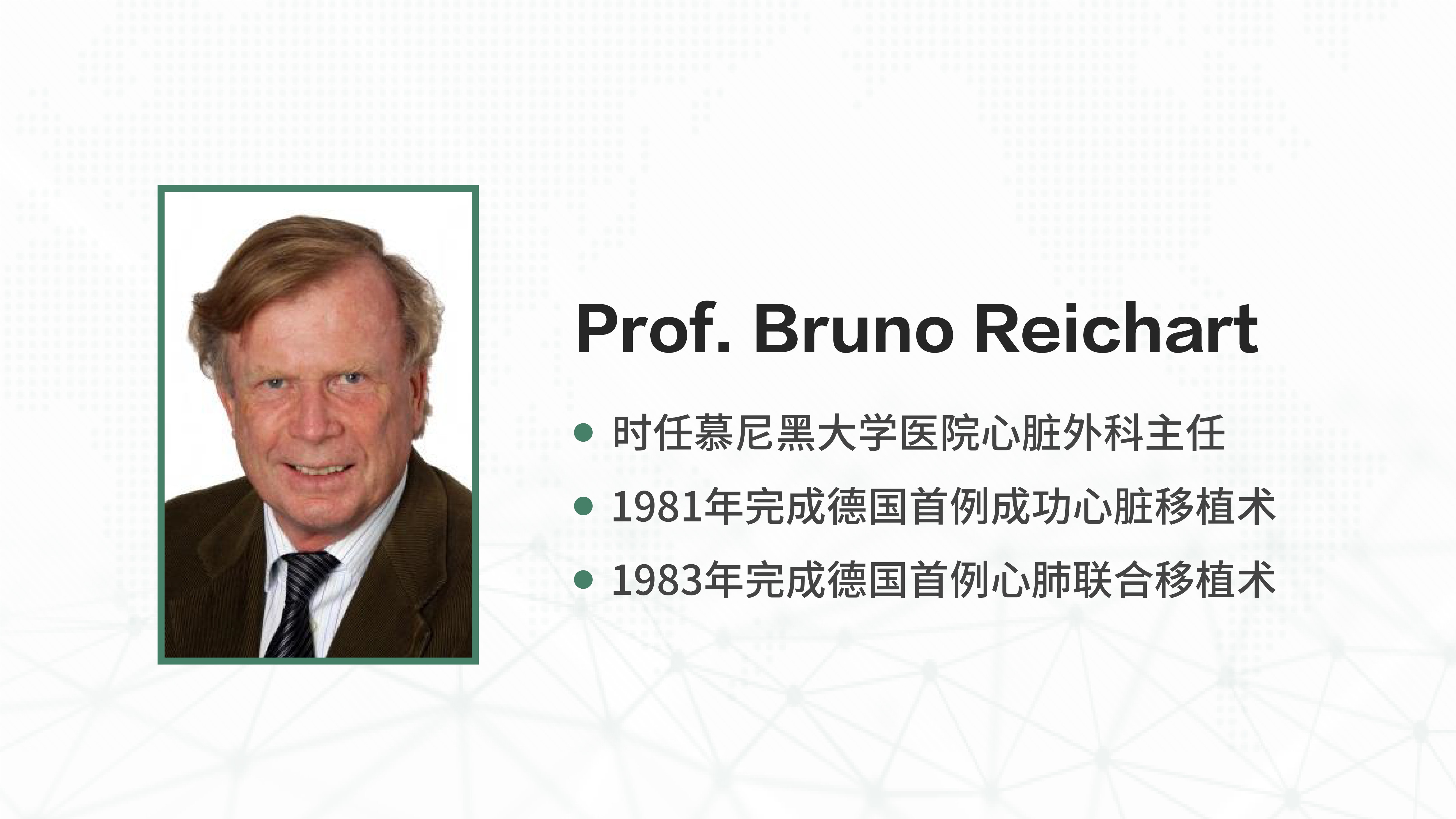
Prof. Bruno Reichart
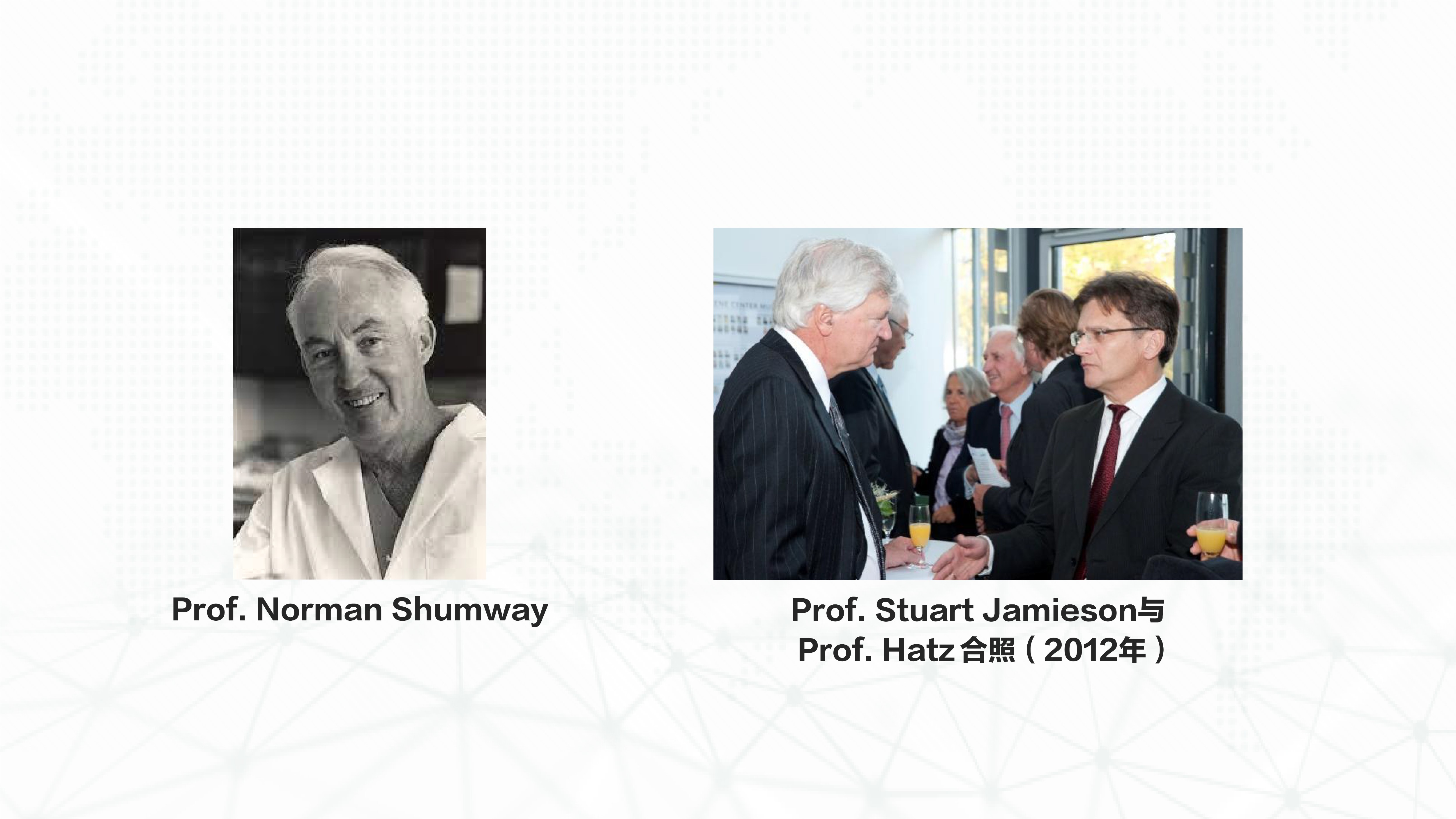
Prof. Norman Shumway(left); Prof Stuart Jamieson and myself in 2012
Another very important mentor in my career was Prof. Georg Heberer. He was Chairman of Surgery at LMU University when I first witnessed him as an excellent teacher in the auditorium during my clinical studies in Medical School. I was very impressed by his clinical expertise and character, so I decided to apply as a resident in surgery in his department when I finished Medical School. He was a renowned general surgeon with great expertise in visceral, vascular, and thoracic surgery. Prof. Heberer became chairmen of surgery in Munich in the seventies and - as it has been a tradition since 1918 in the Munich Surgical School - he put special emphasis on thoracic surgery. His predecessor war Prof. Zenker who performed the first heart transplant in Germany together with Prof. Klinner and Prof. Sebening. Thoracic surgery in Munich was established by Prof. Ferdinand Sauerbruch in 1918. He was chairman of surgery from 1918 to 1928 in Munich. He had been the first to devise a special operating room in which atmospheric pressure in the room was reduced by a suction pump to prevent the lung from collapsing following the opening of the chest. Nowadays, of course, the patient’s airway is intubated and we use positive air pressure through the intubation tube to prevent the lung from collapsing during surgery.
Prof. Heberer’s outgoing manner and sincere enthusiastic interest in the field of surgery greatly inspired me to pursue an academic career in surgery, and he urged me to engage in further scientific research in the surgical field. He taught me something which is very important: if you want to learn to do something in perfection and with sincere intent you have to do it with your whole heart and mind. This is also true for all other things you may want to do.
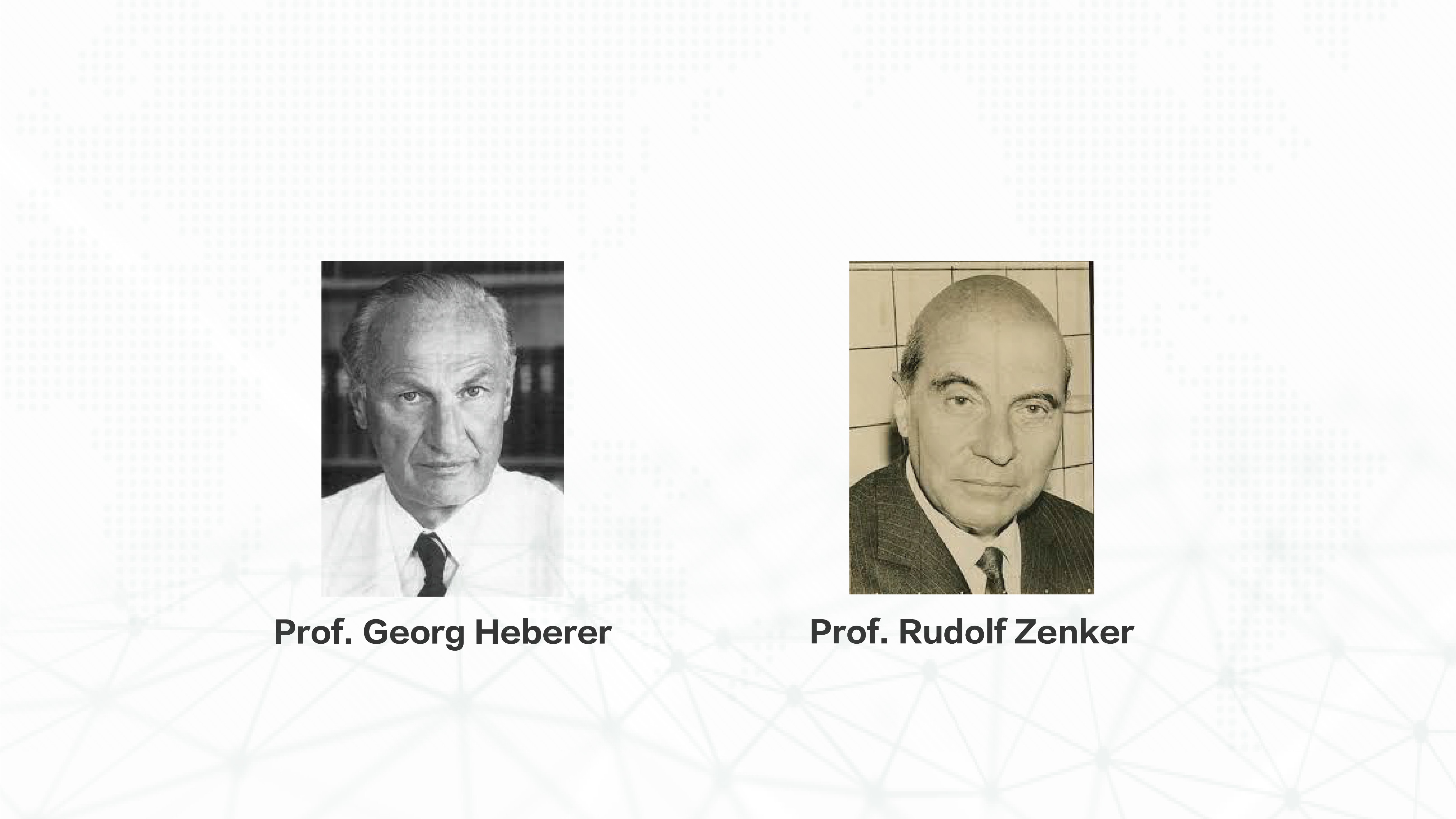
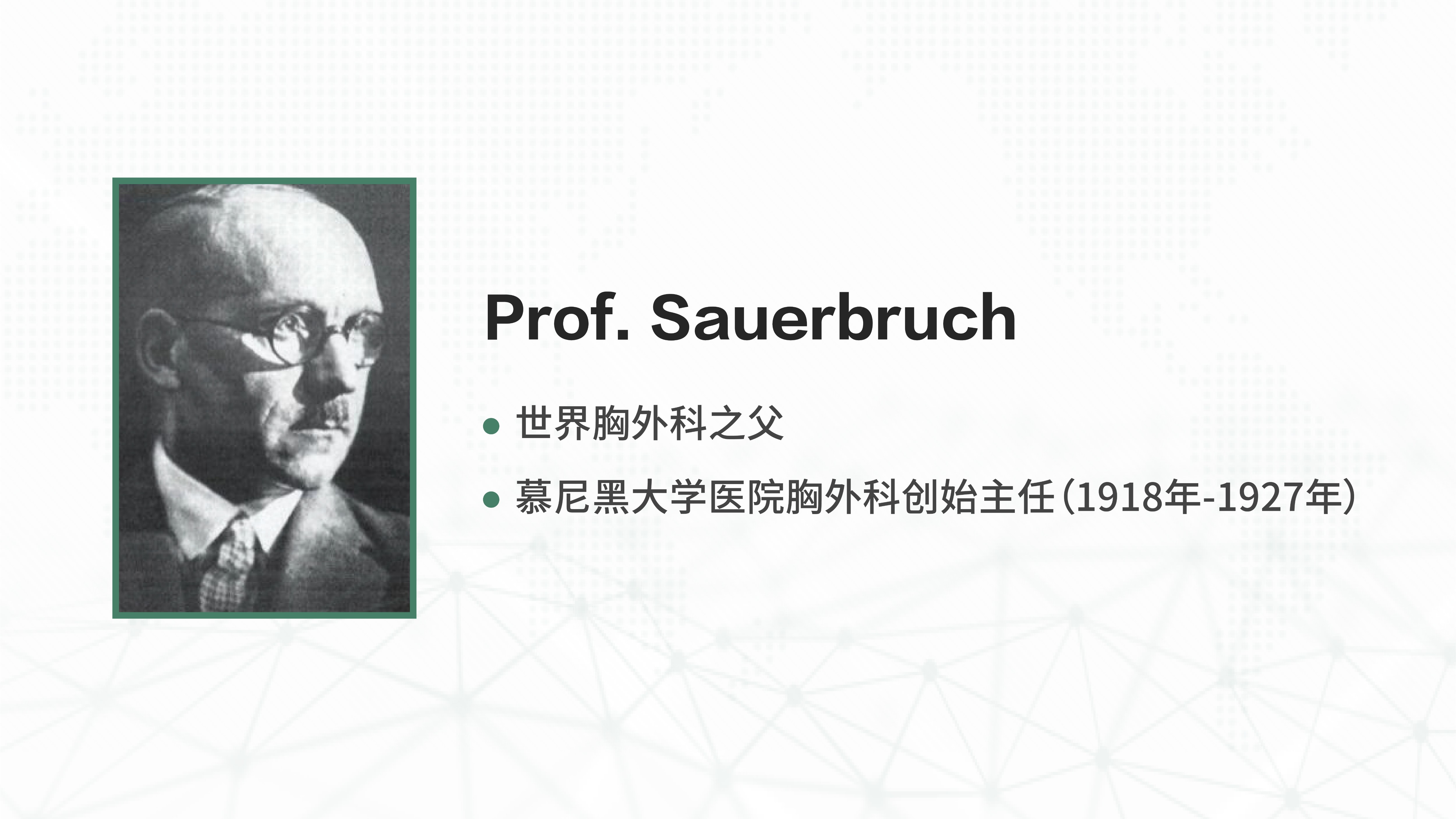
Prof. Sauerbruch
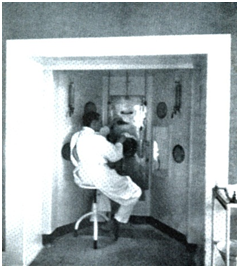
Low pressure chamber with the patient’s head outside the chamber and the anesthesiologist sitting aside the patient
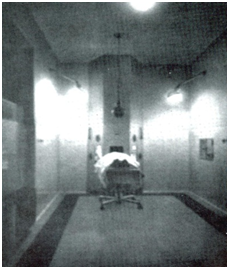
The under-pressure chamber with the patient’s body inside. The surgeons would stand in the small chamber and operate. Thus the lungs would not collapse and the patient would not suffocate
I, therefore, applied for the renowned Chiles research fellowship at Harvard University, Massachusetts General Hospital in Boston, USA. I performed basic research in mucosal immunology in the laboratory of mucosal immunology of Prof. Allan Walker. I was particularly interested in the immune cells and their reactions in the mucosal barriers of the intestinal and respiratory tract. During my studies in Boston, I also met Prof. Paul Ehrlich who was one of the leading wound healing experts at that time. He convinced me to look at how immune cells especially macrophages regulate wound healing processes.
I returned to Munich and trained as a General Surgeon followed by specialty training in visceral and vascular surgery including one year in heart surgery with Prof. Klinner. However, I always had the most interest in thoracic surgery, so I also specialized in this field due to my research interests in the respiratory tract and immunology especially in lung transplantation which I participated in early on (since 1989). Prof. Heberer and Prof. Schildberg, his successor had given me great support. My last chief and mentor Prof. Jauch supported my appointment as full professor in thoracic surgery and chairman of the Department of Thoracic Surgery at the LMU in 2005.
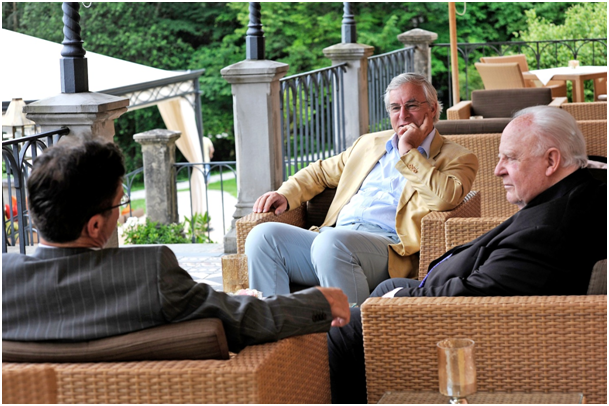
Prof. Schidberg (on the right), Prof. Jauch (center) and myself during a chat at the Meeting on Immunotherapy of Solid Cancer at Lake Stranberg
Constant interactions such as fellowships with other experts in the surgical field at other hospitals and countries let you gain tremendous knowledge and know-how. Your mind opens to other possibilities in problem-solving not only in research but also in your everyday clinical routine. I am so grateful and I thank all of my mentors and colleagues who made it possible for me to participate in these multiple extraordinary interactions throughout my career.
Question3: As a university professor and chief of thoracic surgery at two renowned hospitals, how do you balance the administration, clinical practice, research activities, teaching, and personal life?
In 2006 after my appointment as full professor at the LMU I was asked if I would take over the vacant chief position in thoracic surgery at the Asklepios Lung Center in Gauting, a small city just outside of Munich. Both departments always had strong cooperation in patient treatment. The lung center in Gauting belongs to one of the three largest hospitals for lung disease and lung cancer in Germany. It was established in the 1960s and became a renowned lung center not only for the treatment of tuberculosis but for thoracic malignancies under the famous thoracic surgeon Prof.Herbert Blaha who was chairmen of the hospital from 1965 to 1983.
So decided to join the efforts and excellent expertise of both centers in the field of thoracic surgery, and I founded the Thoracic Surgery Center Munich in 2007 which includes both hospitals the University Medical Center, Klinikum Großhadern LMU Munich, and the Asklepios Lung Center Gauting.
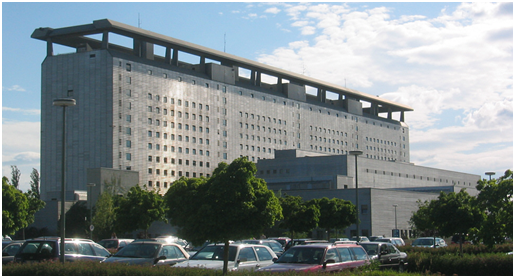
University Medical Center Klinikum Großhadern Ludwig Maximilian University Munich
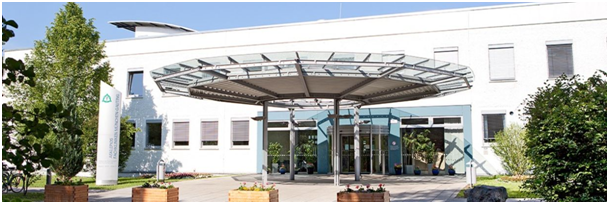
Asklepios Lung Center Munich-Gauting
The key to the success of this joint venture are my staff members and residents. I can rely on every one of them. All of them have ongoing research projects and are greatly engaged in student teaching. During their four-year training in the surgical specialty thoracic surgery, my residents spend at least one year in each department. They, therefore, see every aspect of thoracic surgery from pectus excavatus surgery to sequential double lung transplantation not forgetting the very large number of patients with thoracic malignancies at both hospitals. I am very proud of them and I believe they greatly appreciate the excellent opportunities they have within this academic setting of our Thoracic Surgery Center. Many of my residents and senior staff members who have left us have gained superior positions throughout Germany. Two examples are Prof Hauke Winter who became chairmen of the department of thoracic surgery of the University of Heidelberg in 2017, one of the largest centers especially for lung cancer in Germany, and Prof. Gerd Preissler who became chairman of thoracic surgery at the prestigious Robert-Bosch hospital in Stuttgart in 2019. There are numerous others.
The key to the success of this joint venture are my staff members and residents. I can rely on every one of them. All of them have ongoing research projects and are greatly engaged in student teaching. During their four-year training in the surgical specialty thoracic surgery, my residents spend at least one year in each department. They, therefore, see every aspect of thoracic surgery from pectus excavatus surgery to sequential double lung transplantation not forgetting the very large number of patients with thoracic malignancies at both hospitals. I am very proud of them and I believe they greatly appreciate the excellent opportunities they have within this academic setting of our Thoracic Surgery Center. Many of my residents and senior staff members who have left us have gained superior positions throughout Germany. Two examples are Prof Hauke Winter who became chairmen of the department of thoracic surgery of the University of Heidelberg in 2017, one of the largest centers especially for lung cancer in Germany, and Prof. Gerd Preissler who became chairman of thoracic surgery at the prestigious Robert-Bosch hospital in Stuttgart in 2019. There are numerous others.
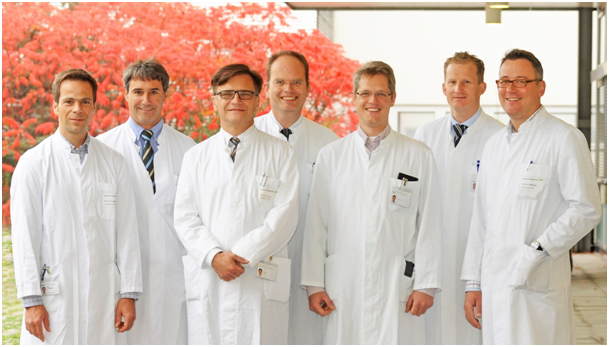
Question4:What is your proudest career achievement to date and why?
I wouldn't say there is only one proudest career achievement, there are always. several in each person’s career. One is certainly that we were able to create one of the largest lung transplant centers in the world under my leadership. We are achieving 90 to almost over 100 transplants a year. I was able to play a large role in this development reaching back to 1990 when we did the first lung transplant at our center. I formed the Munich Lung Transplant Group (MLTG) in 2005 consisting of heart surgeons, anesthesiologists, pulmonologists, and thoracic surgeons interested in developing lung transplantation. We have performed many studies including new operative techniques as in bronchial anastomosis and studies concerning new immunosuppressant and antiinfective drugs. One very important study with great impact worldwide covered the use of the new immunosuppressant drug tacrolimus after lung transplantation opening the door for its use as a standard immunosuppressive drug following lung transplantation.
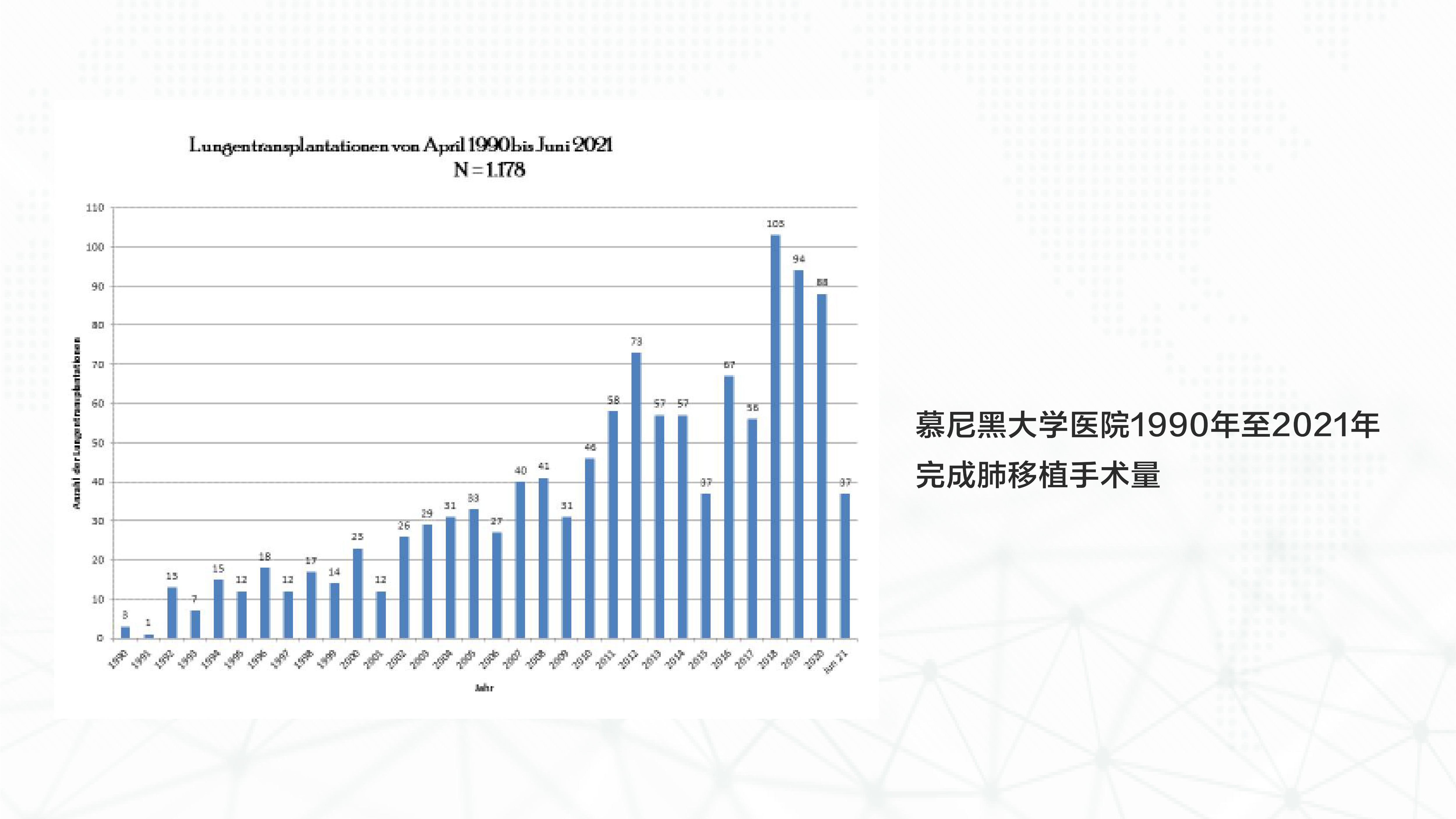
Lung transplantation from 1990 to 2021 at the LMU University Hospital Munich
achievement is the activity we have been developing throughout the years in the area of immunology and immunologic therapy of lung cancer. We were one of the very first who initiated specific high-level meetings on this topic the first one being held at the beautiful Bavarian lake Lake Tegernsee in 2002 and the second in 2005. The third meeting was held at Lake Starnberg in 2009. We owe great appreciation to the Chiles Foundation, Portland Oregon USA who sponsored these meetings and have also supported numerous research fellowships of young residents and junior staff members of my department throughout the years. Close research collaborations developed especially with Hospitals at the Harvard University Medical School and the Earle A. Chiles Cancer Research Laboratory in Portland, Oregon. The studies dealing with the immunology of lung cancer and possible therapy with vaccines started in 1996 under my supervision more than ten years before the first breakthroughs in immunochemotherapy (e.g. PDL-1) of lung cancer were reported.
One achievement in minimally invasive thoracic surgery was the development and first application of the rendevous technique in benign tumors of the esophagus. l I combined an endoscopic approach with a simultaneous thoracoscopic approach for their removal. I was awarded the prize for minimally invasive surgery by the German Surgical Society in 2001. Another is the first implementation of HITOC (Hypertheric Intrathoracic Chemotherapy ) in patients with pleural mesothelioma in Germany. We now have the largest patient cohort which received this treatment modality with increasing numbers every year.
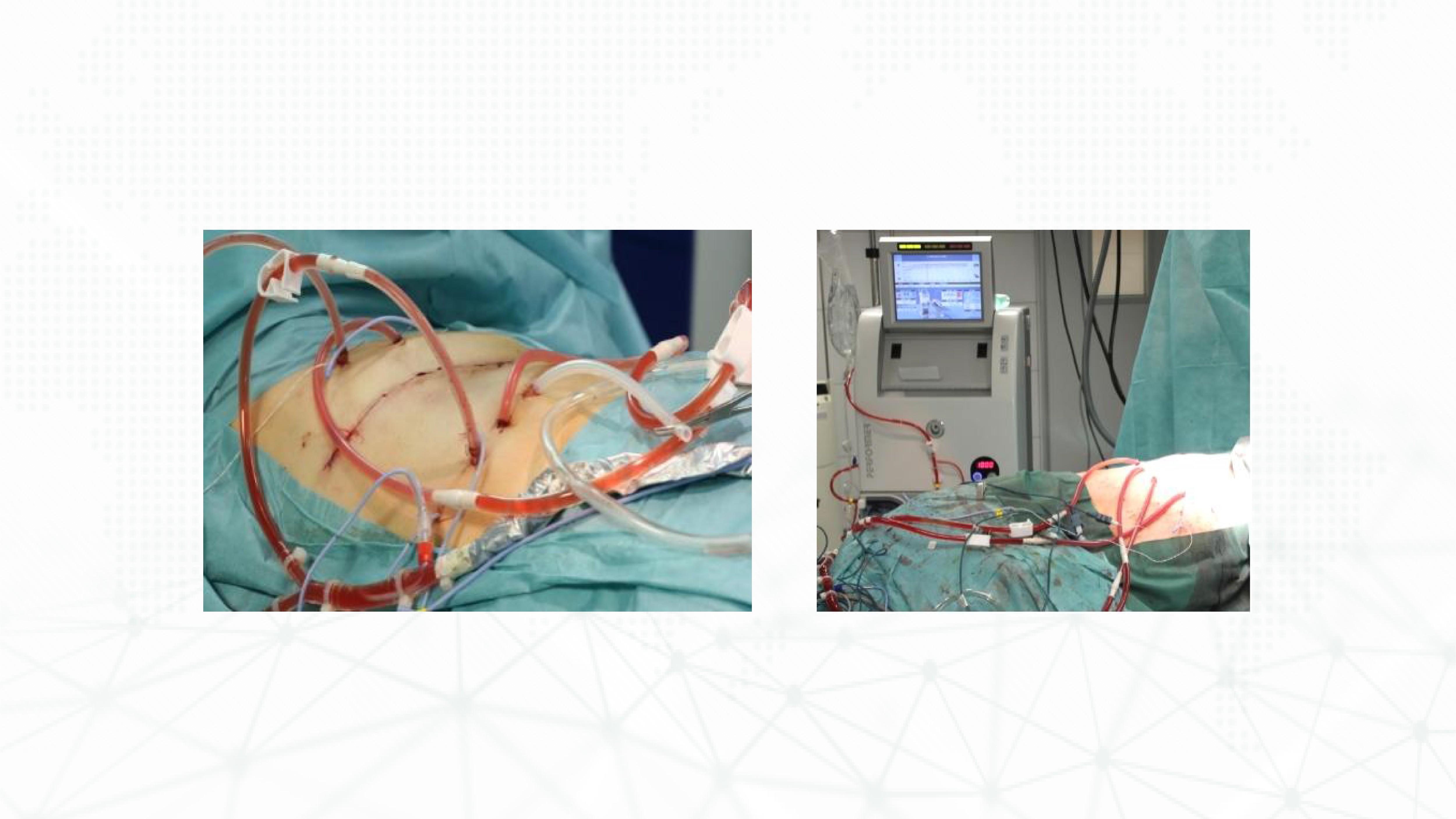
Hyperthemic intrathoracic chemotherapy (HITOC) following total radical pleurectomy or extrapleural pleurapneumonectomy (EPP) in patients with pleuramesothelioma
I am especially proud of the success and personal development of all my colleagues who went through their academic career under my guidance. This is probably the most valuable achievement I call tell you of.

Senior consulting surgeons and myself at the University Campus of the Thoracic Surgery Center Munich in the year 2017.
All my colleagues in the picture have since then taken over chairmen positions all over Germany. Prof. Winter is standing to my right.
Question5: The Covid-19 pandemic is one of the biggest facing modern healthcare. What impact do you see this having on the field of thoracic surgery?
We have been involved in studying the potential impact of the Covid-19 infection on thoracic surgery. Our district here in Gauting was the very first in Germany in which the first infected person was identified in January of 2020. We immediately began evaluating our patients in February of 2020 developing algorithms for diagnosis and treatment especially in patients undergoing thoracic surgical procedures. Since then we have published three papers on these various aspects. A fourth one is in preparation. Patients with lung cancer are at a special high risk through a covid 19 infection and must be monitored appropriately.
More importantly, we have been confronted with this disease in patients with Covid 19 destroyed lungs and lung failure. So far we have successfully performed 3 lung transplants in patients referred to us from all over Germany. Others are still on ECMO at the university hospital and are awaiting transplantation.
So, I believe Covid 19 will closely accompany us in the future especially in transplant patients and patients with lung cancer.
Question6: May I ask do you know about Prof. CHEN JingYu and his team from Wuxi Lung Transplant Center, Wuxi People's Hospital Affiliated to Nanjing Medical University, Wuxi?
Unfortunately, I have never met Prof. CHEN, however, I have heard much of him and his team. They have recently written a very impressive review article on lung transplantation in China depicting its past and it‘ future. I have also heard that he performed the first lung transplant in a through Covid 19 induced lung failure patient. I congratulate him on this great achievement!
Question7: What advice would you give to someone hoping to start a career in thoracic surgery?
It is very important to get sound basic training in general surgery and intensive care medicine before entering thoracic surgical training. Here in Germany residents first apply to general surgery for two years of training including intensive care medicine. My own training was six years general surgery, 3 years visceral fellowship, and thereafter thoracic surgical training fellowship 3 years. However, such training development is not offered anymore.
If a young doctor want’s to pursue an academic career two years of research either basic or clinically applied should be included. This means the candidate must have patience, be open to new innovative techniques and therapies, and must be very enthusiastically hard working in heart and mind. Probably hard work is the most important asset a young bright medical doctor must have for being successful next to creativity and innovativeness. But even more important is the spirit behind his work.
Question8: What would you have been if you had not been a medical doctor?
In my early teens, I always was playing with the idea of becoming a musician, a pianist. Either a classic concert pianist or a jazz pianist since I very much like both music categories. Music has always been a big part of my life and I couldn‘t live without it.
However, I realized somewhat later that my interest and science and technology was enormous and I thought at that time my musical talent was good enough for an amateur musician but not for a professional career. When I got older I actually was thinking of applying to pilot school at the age of 18. However, at that time they wouldn’t accept a student if he has a myopia (far-sightedness) that is he needs eyeglasses. I had them since I was sixteen. I heard that nowadays that wouldn’t be a problem and one can get accepted to a pilot school.
Question9: What are your interests and hobbies outside of medicine?
Of course, as I have just pointed out music. I still like to play at home and attend festivals, concerts, jazz bars, and many other things surrounding music.
I spend lots of time in the garden. I have a large garden and in the past ten years, I have come to love gardening not only flowers but also vegetables for your own use and many other things. For me, I can relax and it has something very soothing to one’s soul and mind. It's like meditating when you are working in the garden.
All my life have been engaged in different sports. I believe you have to keep your body and health in shape. Only then will your mind stay sharp and happy. However, the most important thing for me in sports is that I have tremendous fun and I do it with my heart. All year round I train every week in the art of Pakua, old martial art that originated in China. I love to go sailing. I live near Lake Starnberg outside of Munich., so I don’t have to travel far. I don’t have a boat of my own but my friend takes me along as often as he can. I love to dive especially in the red sea. I love to go hiking since I live near the Bavarian alpine region e.g. recently we were on Germany’s highest mountain the Zugspitze in Garmisch-Partenkirchen. I am a passionate skier in the wintertime. So there are always a lot of different activities I get involved in depending upon the season.
Question10: Can we ask a private question? We heard that your daughter had been an exchange student in Beijing high school for a year, what did she learn from that in your opinion?
My daughter, Anna-Katharina was an exchange student from August 2007 to Juli 2008 in Yanquing near Beijing. She was in a High School Junior class equivalent to the German 11th Grad in Gymnasium. She first started in the foreign student class for two months and then was able to move to the normal Chinese class. My wife and I visited the school and the director was so kind to show us around. She stayed with a very nice host family during her year there. The experience she made was tremendous. It opened her mind and she made many friends in China. It expedited her further achievements here in Germany greatly. She will be receiving her Ph.D. degree in inorganic chemistry this summer. She works at the Max Plank Institute in Stuttgart in cooperation with the University of Munich. She specialized in the chemistry of electric battery development, designing new batteries for industry, cars, etc. which will be very important in the future.
